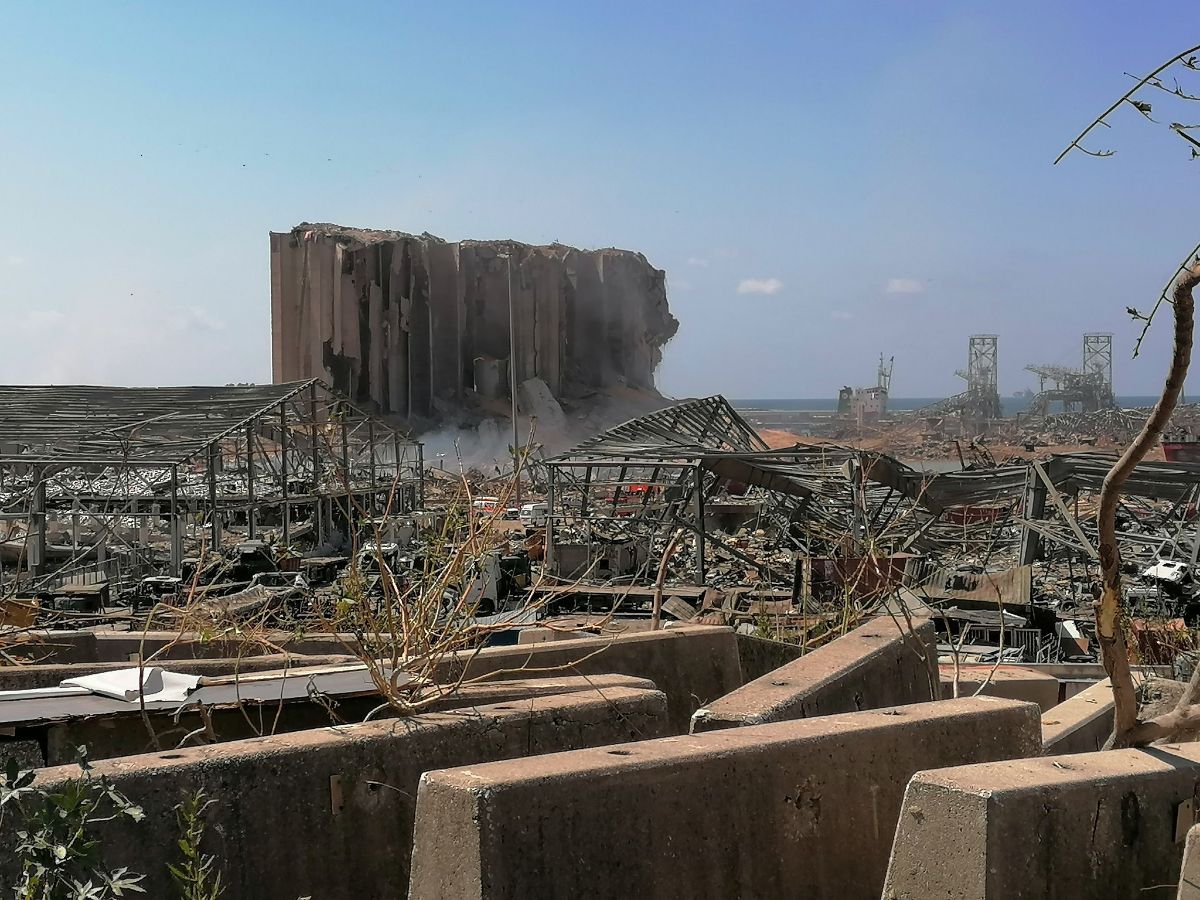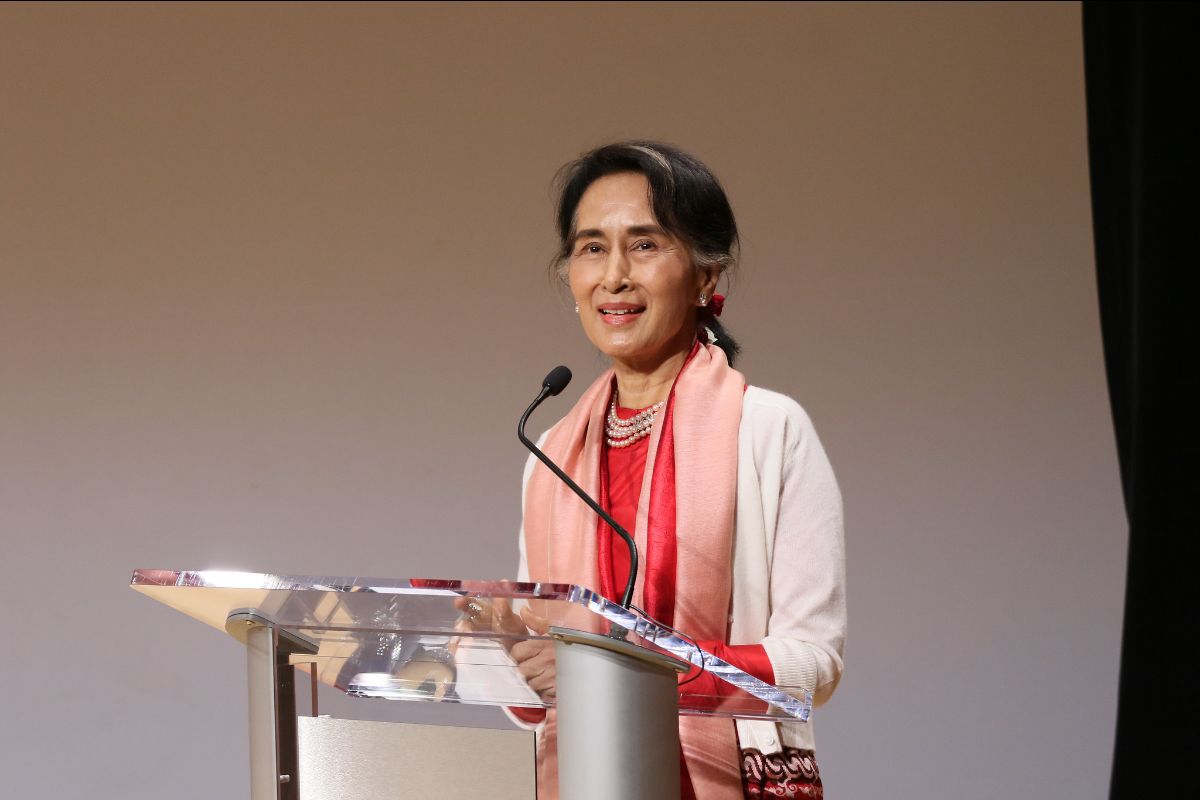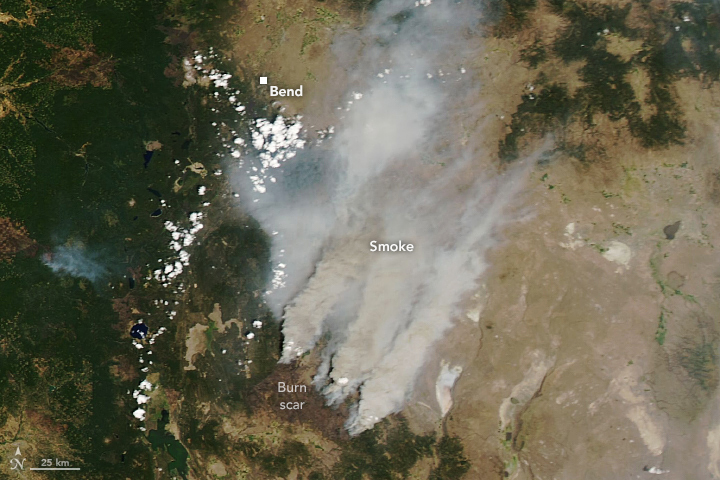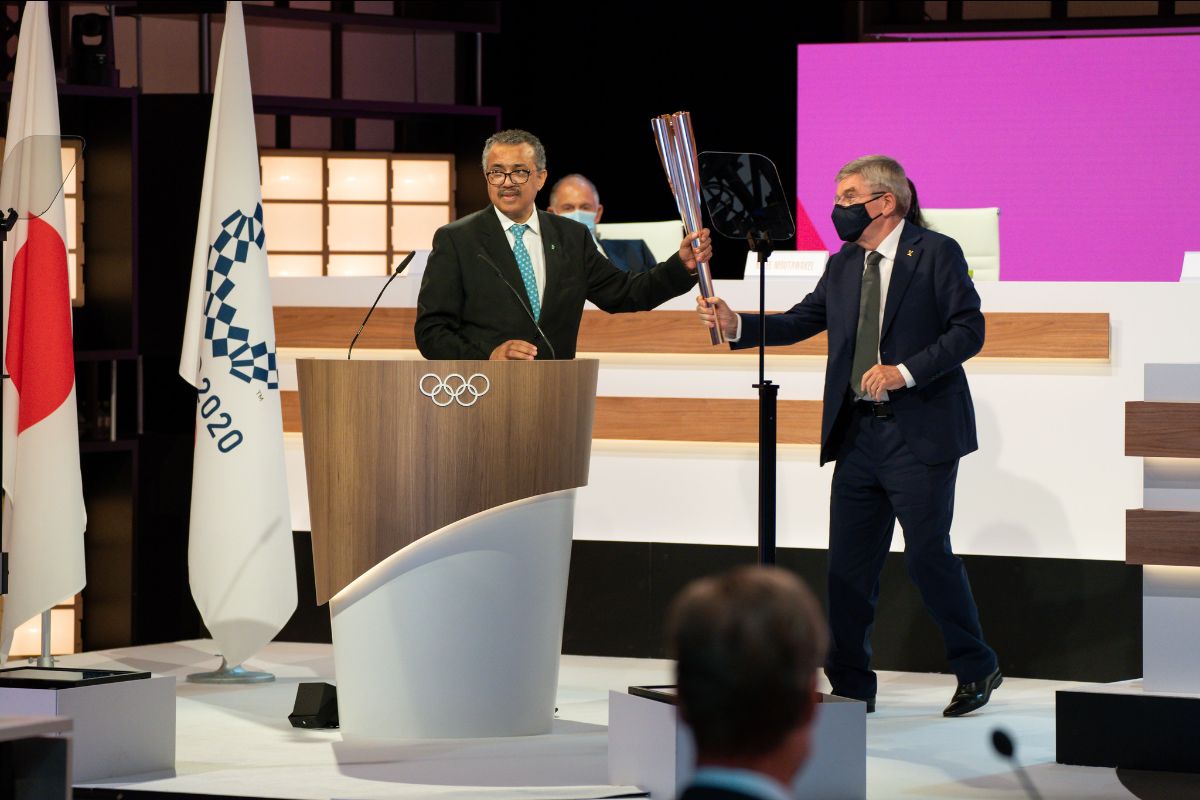Top photo: World Health Organization head Tedros Adhanom speaks Wednesday at the 138th IOC Session in Tokyo ahead of the Olympic Games. (Photo: IOC / Greg Martin)
Welcome to Factal Forecast, a look at the week’s biggest stories and what they mean from the editors at Factal. We publish our forward-looking note each Thursday to help you get a jump-start on the week ahead. If this email was forwarded to you, and you like what you see, you can subscribe for free.
A look ahead:
July 22/ WHO chief in Japan for Olympics: World Health Organization head Tedros Adhanom Ghebreyesus has arrived in Tokyo to show support for the delayed Olympics amid continuing concerns about the spread of coronavirus.
- What’s happened so far: Approximately 11,000 athletes, in addition to staff and media, have converged on the Olympic Village in Tokyo Bay, prompting public criticism over the potential for a coronavirus infection cluster following the emergence of the highly transmissible Delta variant. Authorities have registered more than 70 games-related coronavirus cases so far, including at least two athletes and a video analyst residing at the Olympic Village.
- The impact: Tedros said in a speech Wednesday that he believes international sporting events such as the Olympics can be held while minimizing the risk of virus spread if the host country adopts sufficient precautionary measures. He also criticized the uneven distribution of vaccines favoring rich countries, blaming the system for the resurgence of virus spread.
July 23/ Haitian president’s funeral: Jovenel Moïse will be laid to rest on Friday in Cap-Haïtien after being assassinated earlier this month.
- What’s happened so far: Moïse, a controversial figure in Haitian politics, was shot to death on July 7 in an attack that also injured his wife. Investigators said a Haitian-American named Christian Emmanuel Sanon orchestrated the operation as a way to put himself in power. Sanon, a doctor and a preacher, denied the allegation even after police found ammunition, holsters, foreign license plates and a cap labeled “DEA” in the building where he was arrested. The head of security at Haiti’s Presidential Palace has also been detained. Earlier this week, Prime Minister Claude Joseph announced he would step down and hand power to Ariel Henry, who Moïse announced as his pick for prime minister just days before the assassination.
- The impact: Moïse’s widow will be at the funeral, so security will be tight. Emotions will also be running high. More protests may occur throughout the country and the strength of the country’s democracy will be put to the test immediately.
July 25/ Kazakhstan holds local elections: Kazakhstan is set to hold elections for more than 700 rural district heads Wednesday. It will be the first time the local heads, known as akims, will be directly elected by the population.
- What’s happened so far: Last May, Kazakh President Kassym-Jomart Tokayev signed into law a measure that would, among other things, implement direct elections nationwide for local heads of villages, towns and rural districts. Previously, such leaders were typically appointed by higher leadership or electors from local administrative bodies, despite some electoral experiments in select districts dating back to 1999. The rural akims will be elected for four-year terms and all candidates must meet certain eligibility requirements.
- The impact: The new electoral system aims to boost political participation within the 40 percent of Kazakhstan’s population that live in rural areas. It is among several political reforms from Tokayev, 10 of which have been signed into law and adopted. While analysts and observers say such measures are a development toward a more robust political system, it remains to be seen whether residents will come to the polls to cast their vote.

(Photo: UN-Habitat Lebanon / Flickr)
July 26/ Lebanon consultations on new government: Lebanon’s parliament will begin new consultations Monday, with the hopes of choosing a new prime minister following Saad Hariri’s resignation.
- What’s happened so far: Hariri, Lebanon’s prime minister-designate, resigned from his post last week after President Michel Aoun rejected his latest proposal nearly 10 months after he was tasked with forming a government. Lebanon has been governed by a caretaker administration for nearly a year after former Prime Minister Hassan Diab’s cabinet resigned in the wake of the deadly Beirut port explosion. Under Lebanon’s sectarian power-sharing system, the prime minister must be a Sunni Muslim.
- The impact: The political crisis gripping Lebanon could not come at a worse time given the country’s economic woes. With unemployment skyrocketing and the Lebanese pound plummeting, the World Bank said the crisis could rank among the three worst since the mid-1800s as far as its impact on living standards. With the aftermath of the Beirut blast, Lebanon’s continued centrality in the struggle between Iran and Israel, and the efforts to accommodate the massive influx of Syrian refugees, there will be no shortage of crises for the new government to address.
July 26/ Expected trial for Aung San Suu Kyi: Myanmar’s deposed leader Aung San Suu Kyi is expected to stand trial as early as Monday, in a culmination of legal efforts against her originating from the Feb. 1, 2021 military coup.
- What’s happened so far: Initially deposed and arrested in February by Myanmar’s military council, Suu Kyi has been charged with multiple offenses, including corruption and several offenses under the colonial-era state secrets law, all of which carry the possibility of roughly 15-year sentences. She is also facing a variety of additional lesser charges, such as breaking coronavirus protocols.
- The impact: Critics allege the charges are trumped up and an effort to indefinitely weaken Suu Kyi’s popular political party that swept elections last November, prompting allegations of fraud by the military. Suu Kyi remains a central symbol of the anti-coup protest movement that continues to persist despite a sustained brutal crackdown by the military that has seen approximately 1,000 citizens killed. While Suu Kyi will likely face a guilty verdict, the political unrest in Myanmar appears likely to continue.

on her country’s political and economic development in September 2016.
(Photo: Ellen Wallop / Asia Society)
July 26/ St. Lucian general election: The small Caribbean island of St. Lucia will hold fresh elections on Monday in which Prime Minister Allen Chastanet will seek a new mandate.
- What’s happened so far: After months of speculation surrounding the date of the elections, Chastanet announced a vote would take place Monday after ensuring it was safe to hold during the coronavirus pandemic. The island put tough restrictions in place as soon as the first cases were confirmed, managing to contain the spread. It recorded just over 5,000 cases and 87 deaths since the start of the pandemic. Schools, used as voting centers, will be closed Monday.
- The impact: The prime minister said this election will be “an election for the ages,” with the country “at the crossroads” as his United Workers Party works on plans to develop the country. Meanwhile, St. Lucia Labour Party’s leader Philip J. Pierre said these elections were about “rescuing” the country from “becoming a failed state” due to corruption and violation of laws and standards of good governance.
July 27/ Runoff election for Texas’ 6th congressional district: Two Republican candidates are facing off in Texas’ 6th congressional district runoff election on Tuesday. The district has been without representation since incumbent Rep. Ron Wright died following a coronavirus diagnosis.
- What’s happened so far: In the first round of the election, no candidate managed to secure 50 percent of the vote, leading to a runoff. The two candidates who captured the most votes, but fell short of a majority, were Wright’s widow Susan Wright and Texas state Rep. Jake Ellzey, both of whom are Republicans. Democrats had hoped that fast-changing demographics would make this a more competitive race, but Lynne Sanchez of Fort Worth fell short and failed to make the runoff.
- The impact: Republicans are hoping to take back the U.S. House in next year’s midterm elections, though this race won’t inch them closer to their goal of a majority. Turnout will be the one to watch with fears that in a same-party race, many voters won’t show up to the polls.
July 28/ Pedro Castillo to be sworn in as president of Peru: Pedro Castillo will take office on Wednesday after winning Peru’s presidential election following weeks of litigation and accusations of fraud.
- What’s happened so far: Peru’s electoral body announced Monday that Peru Libre candidate Pedro Castillo is officially the new president of the country. The proclamation from the electoral court was delayed for over a month due to multiple lawsuits and demands to annul the vote count presented mainly by Castillo’s opponent Keiko Fujimori. Although the National Electoral Jury announced in June that Pedro Castillo had won more than 50 percent of the vote, the ratification of the results was postponed until all electoral fraud accusations were reviewed and dismissed. Fujimori agreed to recognize the results Monday despite maintaining that Castillo’s victory was “illegitimate.”
- The impact: The new administration will start this term with one vice president instead of two after Peru Libre founder and vice presidential candidate Vladimir Cerrón was banned from office over a corruption conviction. Castillo’s administration is expected to attempt broad reforms, including reforming the constitution, to tackle the severe socioeconomic inequalities that have led to sparks of civil unrest in recent years.
July 30/ Planned Boeing Starliner launch: After several delays, Boeing and NASA have scheduled a second uncrewed test flight of Boeing’s CST-100 Starliner commercial crew spacecraft Saturday.
- What’s happened so far: The first iteration of this same mission in December 2019 was unsuccessful after the CST-100 Starliner failed to reach the International Space Station because of a timer error and returned to Earth in a shortened flight. Since then, second attempt has faced months of delay largely due to the busy schedule of other launches and International Space Station missions.
- The impact: The test flight is largely to prove the Starliner spacecraft can safely carry astronauts to and from the International Space Station as part of NASA’s Commercial Crew Program, an attempt to make space travel cheaper through partnerships with private companies. Boeing hopes to make the Starliner’s first crewed flight before the end of the year.

What else matters:
Bootleg Fire in Oregon: The massive wildfire burning in Southern Oregon is already one of the largest in state history. It’s burned more than 395,000 acres, topping last year’s Beachie Creek Fire in northwest Oregon that killed five people. Officials blame drought and last month’s heat wave for the massive fire, and the blaze is now so large it’s generating its own weather. Pyrocumulus clouds form when a wildfire forces air to rise quickly, which condenses moisture on smoke particles. The Bootleg Fire is creating these clous, which can generate their own lightning and wind and hamper the firefighting effort.
- Watch for: More than a million acres have burned across the United States already this fire season. Those fires are sending smoke thousands of miles away, forcing states like Pennsylvania and New York to issue air quality alerts. As the drought continues across the West Coast, more large fires may pop up and grow exponentially.
Australia coronavirus outbreak: The Australian states of New South Wales, South Australia and Victoria have introduced new restrictions as they battle new outbreaks of coronavirus fueled by the more infectious Delta variant. South Australia began a one-week lockdown on July 20 after recording five cases of the virus, while Victoria extended its ongoing lockdown to July 27. Parts of the Greater Sydney area have been in lockdown since June 23, with restrictions further tightened on July 17, forcing all non-essential retail to close and construction work halted.
- Watch for: Along with the increased infectiousness of the Delta coronavirus variant, Australia’s latest outbreak is attributed to the country’s vaccination rates, which are the lowest in the OECD. Just 17.4 percent of Australians have received a first dose of a coronavirus vaccine, while 11 percent are fully vaccinated. The country has been hampered by supply issues, but received an additional 1 million doses of the Pfizer vaccine on July 19, the majority of which will be directed to areas under lockdown.
Extended outlook: What’s on our radar in the coming weeks
July 22: European Central Bank monetary policy meeting in Frankfurt
July 23: Tokyo Summer Games begin; Haitian president’s funeral
July 25: Azad Kashmir holds general election; local elections in Kazakhstan
July 26: Expected end of trial for deposed Myanmar leader Aung San Suu Kyi; St. Lucian general election; Lebanon consultations on new government begin
July 27: Runoff election for Texas’ 6th congressional district
July 28: Pedro Castillo to be sworn in as president of Peru
July 30: Planned launch of Boeing Starliner Spacecraft 2
Aug. 1: U.S. federal debt ceiling to go back into effect without legislative action
Aug. 2: 54th ASEAN Foreign Ministers’ Meeting
Aug. 3: Special election primaries for Ohio’s 11th and 15th congressional districts; National Night Out in the U.S. against crime; mayoral primary elections in Detroit and Seattle
Aug. 4: International conference in support of Lebanese people
Aug. 12: Zambia general election

